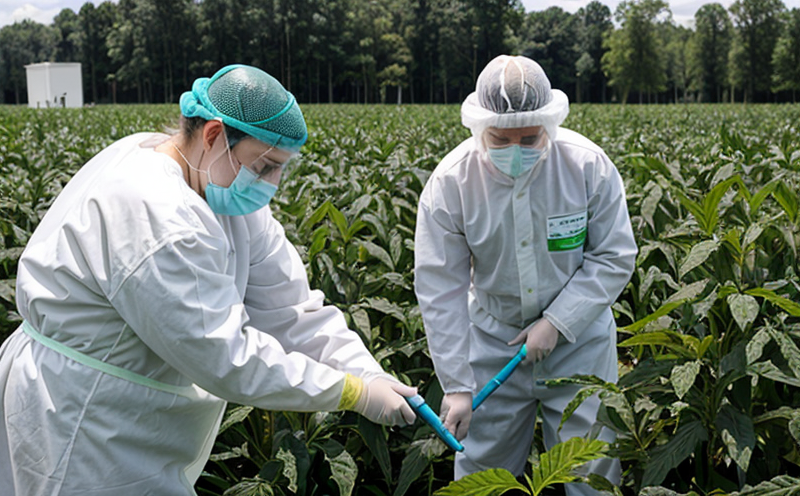ISO 23611 Soil Sampling for Beneficial Microorganism Testing
The ISO 23611 standard provides a robust framework for soil sampling specifically designed to support the testing of beneficial microorganisms. This method is crucial in ensuring that environmental and agricultural practices are sustainable, safe, and effective. The standard ensures accurate and reliable results by providing detailed guidelines on how to collect soil samples from various environments, including arable land, parks, and green spaces.
The process begins with the selection of appropriate sampling points based on the intended use and location. It is important to note that these sampling points should be representative of the entire area under consideration. The number and distribution of these points are critical for obtaining an accurate picture of soil microbial content.
Once the sampling points have been selected, it is essential to follow strict protocols during collection. This involves using clean tools and containers to minimize contamination risks. Samples must also be collected at a standard depth, typically 0-30 cm below the surface, ensuring consistent results across different samples. Post-collection, the samples are immediately placed in cool storage conditions to preserve microbial viability.
The ISO 23611 protocol specifies the use of specific methods for transporting and storing soil samples before analysis. This includes minimizing exposure to air and light, as well as maintaining temperature control throughout transport. Upon arrival at the laboratory, further processing is carried out under controlled conditions to ensure the integrity of the sample.
The testing process itself involves a series of steps aimed at identifying beneficial microorganisms within the soil. These tests may include quantification using cultivation-based methods or molecular techniques such as PCR and sequencing. The results provide valuable insights into the diversity and abundance of beneficial microbes present in the sampled area, which can inform decisions regarding sustainable practices.
By adhering to ISO 23611 standards, laboratories ensure that their findings are accurate and reliable, thus supporting informed decision-making by stakeholders involved in agriculture and environmental management. This standard plays a pivotal role in promoting sustainability through precise measurement of beneficial microorganisms in soil, thereby contributing significantly to ecological balance and productivity.
The importance of this service cannot be overstated, especially considering its relevance across various sectors such as agriculture, horticulture, and urban green spaces. For example, in agricultural settings, understanding the composition of beneficial microbes can help optimize crop yields while minimizing environmental impact. In urban environments, it aids in planning effective strategies for maintaining healthy ecosystems within city landscapes.
In summary, ISO 23611 soil sampling is a fundamental component of any comprehensive approach to managing soil health and promoting sustainable practices. By employing this standard consistently across different applications, organizations can ensure they are making informed decisions based on scientifically validated data.
Why It Matters
The implementation of ISO 23611 soil sampling for beneficial microorganism testing is essential because it allows for precise quantification and identification of these crucial organisms in various environments. Accurate measurement ensures that agricultural practices remain both productive and environmentally friendly, promoting long-term sustainability.
- Ensures consistent results across different samples
- Minimizes contamination risks during collection
- Promotes accurate identification of beneficial microorganisms
- Aids in optimizing crop yields through informed decision-making
The reliability provided by this standard is critical for ensuring that environmental and agricultural policies are based on sound scientific evidence. Without proper sampling techniques, there could be significant discrepancies between reported levels of beneficial microbes, leading to ineffective management strategies.
Moreover, compliance with ISO 23611 helps maintain high standards within the industry, fostering trust among consumers and stakeholders who rely on such practices for their livelihoods or recreational activities. This standard also supports research efforts aimed at discovering new ways to enhance soil health and biodiversity.
Environmental and Sustainability Contributions
The adoption of ISO 23611 soil sampling significantly contributes to environmental sustainability by providing accurate data on beneficial microorganisms in soil. This information is vital for implementing effective strategies that promote ecological balance and productivity.
- Promotes sustainable agricultural practices
- Supports urban green space management
- Facilitates informed decision-making regarding crop yield optimization
- Aids in developing policies aimed at reducing environmental impact
The reliable measurement of beneficial microorganisms helps ensure that these organisms are not inadvertently depleted or compromised, which could have adverse effects on ecosystem health. By maintaining healthy soil microbiomes, this standard plays a key role in preserving natural habitats and supporting biodiversity.
In addition to its direct benefits for the environment, ISO 23611 also contributes indirectly by fostering collaboration between different stakeholders involved in environmental management. This collaborative approach encourages innovation and sharing of best practices across sectors, further enhancing overall sustainability efforts.
Competitive Advantage and Market Impact
The ability to accurately measure beneficial microorganisms using ISO 23611 soil sampling offers significant competitive advantages in the market. Organizations that adopt this standard early on can position themselves as leaders in sustainable practices, thereby gaining a strategic edge over competitors.
- Ensures compliance with international standards
- Promotes reputation for reliability and accuracy among clients
- Fosters innovation through research and development opportunities
- Encourages stakeholder engagement in environmental initiatives
By adhering to this standard, businesses demonstrate their commitment to sustainability, which is increasingly important to consumers who prioritize ethical and environmentally friendly products. This commitment can lead to increased customer loyalty and market share.
In addition to gaining competitive advantages, organizations that utilize ISO 23611 soil sampling also contribute positively to the broader market by setting benchmarks for best practices in environmental management. This contributes to a more informed and responsible industry overall.





